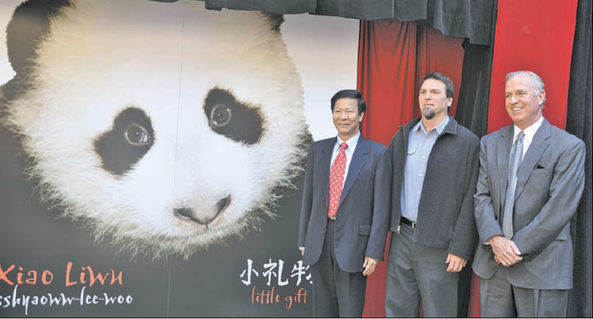'Little Gift' is given his permanent name
Updated: 2012-11-16 14:40
By Wei Wei in New York (China Daily)
|
||||||||
Fifteen weeks after his birth, the San Diego Zoo's sixth giant panda, originally nicknamed "Little Sausage", finally got a formal name this week: Xiao Liwu, or "Little Gift".
 |
|
Qiu Shaofang (left), China's consul general in Los Angeles, attends Tuesday's naming ceremony for panda cub Xiao Liwu at the San Diego Zoo. With him are Ron Swaisgood (center), co-head of the zoo's giant-panda team, and zoo board president Rick Gulley. PROVIDED TO CHINA DAILY |
The zoo received 7,000 name suggestions, submitted by panda lovers from all over the world, with Xiao Liwu winning out among a total of 35,000 votes in an online poll.
Five other names made the short list: Qi Ji (Miracle); Yu Di (Raindrop); Da Hai (Big Ocean); Yong Er (Brave Son); and Shui Long (Water Dragon).
Names were submitted in pinyin, accompanied by the English meaning and a short explanation for the name's significance, said San Diego Zoo spokeswoman Jenny Mehlow.
"There were cute names, funny names and silly names," she said. "But what we were looking for was a respectful and relevant name for the panda."
The cub was born to 20-yearold panda Bai Yun on July 29, making San Diego the zoo with the most giant panda cubs born outside of China.
The Chinese custom is to name babies on their 100- day birthday, which the zoo decided to adopt for naming its panda cubs, Mehlow said.
With the big day falling on Nov 6, Election Day in the US this year, the naming ceremony was delayed by a week.
The event on Tuesday took place at the zoo's Hunte Amphitheater and was streamed live online. Qiu Shaofang, China's consul general in Los Angeles, unveiled the name with Ron Swaisgood, co-head of the zoo's giant-panda program, and Rick Gulley, president of the zoo's board of trustees.
"Six is a lucky number in China," Qiu said. "As the sixth cub of Bai Yun, I'm sure Xiao Liwu will bring luck and fortune to all of us."
He pointed out that pandas have become a symbol of Chinese- US friendship.
The population of giant pandas in the wild is believed to be around 1,600, a sharp increase from 1,000 in the 1970s.
But the endangered animal's survival is still threatened by diminishing habitat and bamboo shortages due to Earth's warming climate, according to a study published last week in the journal Nature Climate Change.
One of only four zoos in the United States that keep giant pandas, San Diego has been working with the Wolong Breeding Center in Chengdu, China, to increase the animals' population.
About 50 percent of panda births are twins, and the mother usually abandons one of the two. Usually, the abandoned cub dies because it can't defecate. Normally, the elimination process is assisted by the mother's frequent licking.
But joint efforts by the San Diego Zoo and Chinese experts have increased the abandonedtwin survival rate to about 95 percent.
This is due to a special milk formula created by the zoo, and the Chinese "twin swapping" technique, in which caretakers rear the abandoned twin in an incubator and exchange it as often as 10 times a day with the other twin so that both cubs can be looked after by their mother.
The San Diego Zoo hasn't yet attempted "twin swapping," but it would be ready to do so if a panda gave birth to twins, Mehlow said.
The zoo also has developed an early pregnancy test for giant pandas, using thermal imaging in addition to an ultrasound for pregnancy detection.
Previously, there was no way to determine whether a giant panda was pregnant, according to the zoo's website. "The scenario for the panda was not always so rosy for the species," said Swaisgood.
"Because of cross-culture collaborations, working together hand in hand with our Chinese colleagues, we've learned a great deal of knowledge of the species, both here in San Diego and back in China."

 Relief reaches isolated village
Relief reaches isolated village
 Rainfall poses new threats to quake-hit region
Rainfall poses new threats to quake-hit region
 Funerals begin for Boston bombing victims
Funerals begin for Boston bombing victims
 Quake takeaway from China's Air Force
Quake takeaway from China's Air Force
 Obama celebrates young inventors at science fair
Obama celebrates young inventors at science fair
 Earth Day marked around the world
Earth Day marked around the world
 Volunteer team helping students find sense of normalcy
Volunteer team helping students find sense of normalcy
 Ethnic groups quick to join rescue efforts
Ethnic groups quick to join rescue efforts
Most Viewed
Editor's Picks

|

|

|

|

|

|
Today's Top News
Health new priority for quake zone
Xi meets US top military officer
Japan's boats driven out of Diaoyu
China mulls online shopping legislation
Bird flu death toll rises to 22
Putin appoints new ambassador to China
Japanese ships blocked from Diaoyu Islands
Inspired by Guan, more Chinese pick up golf
US Weekly

|

|






